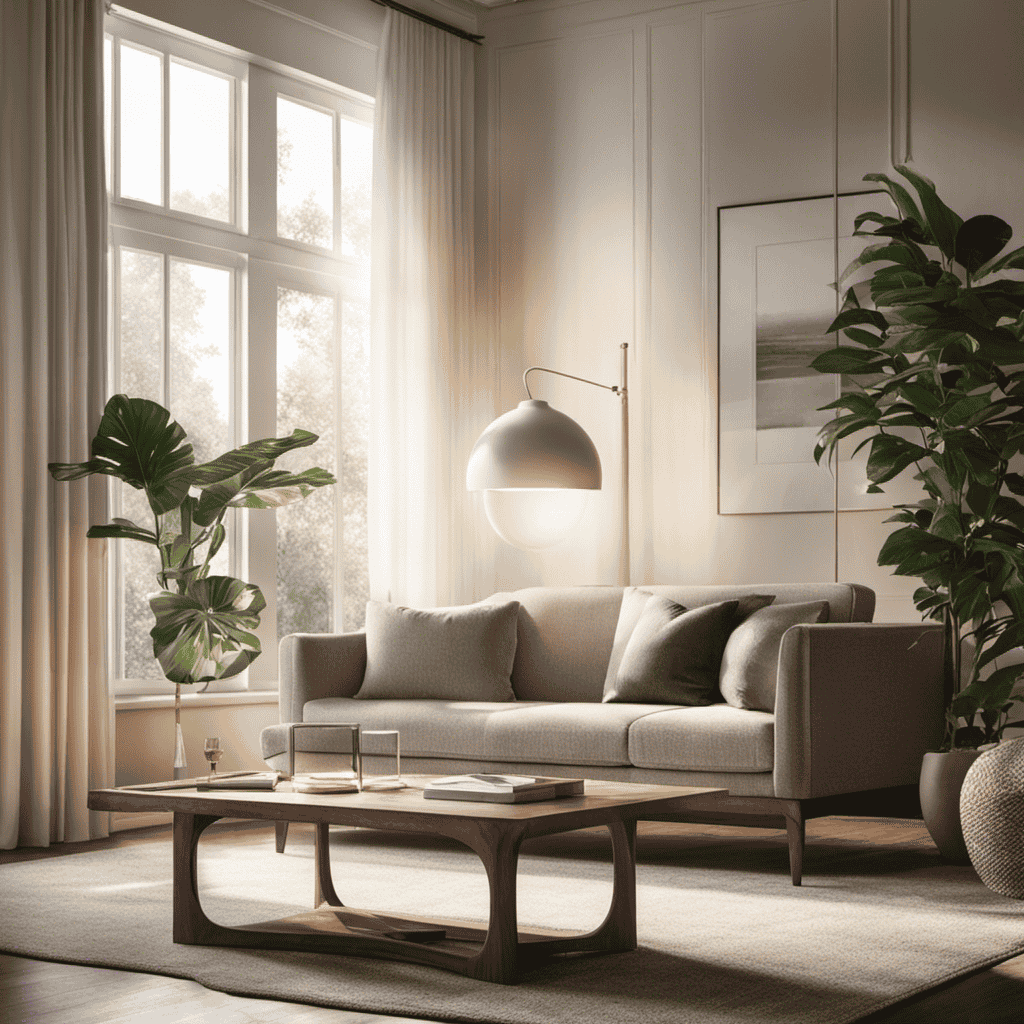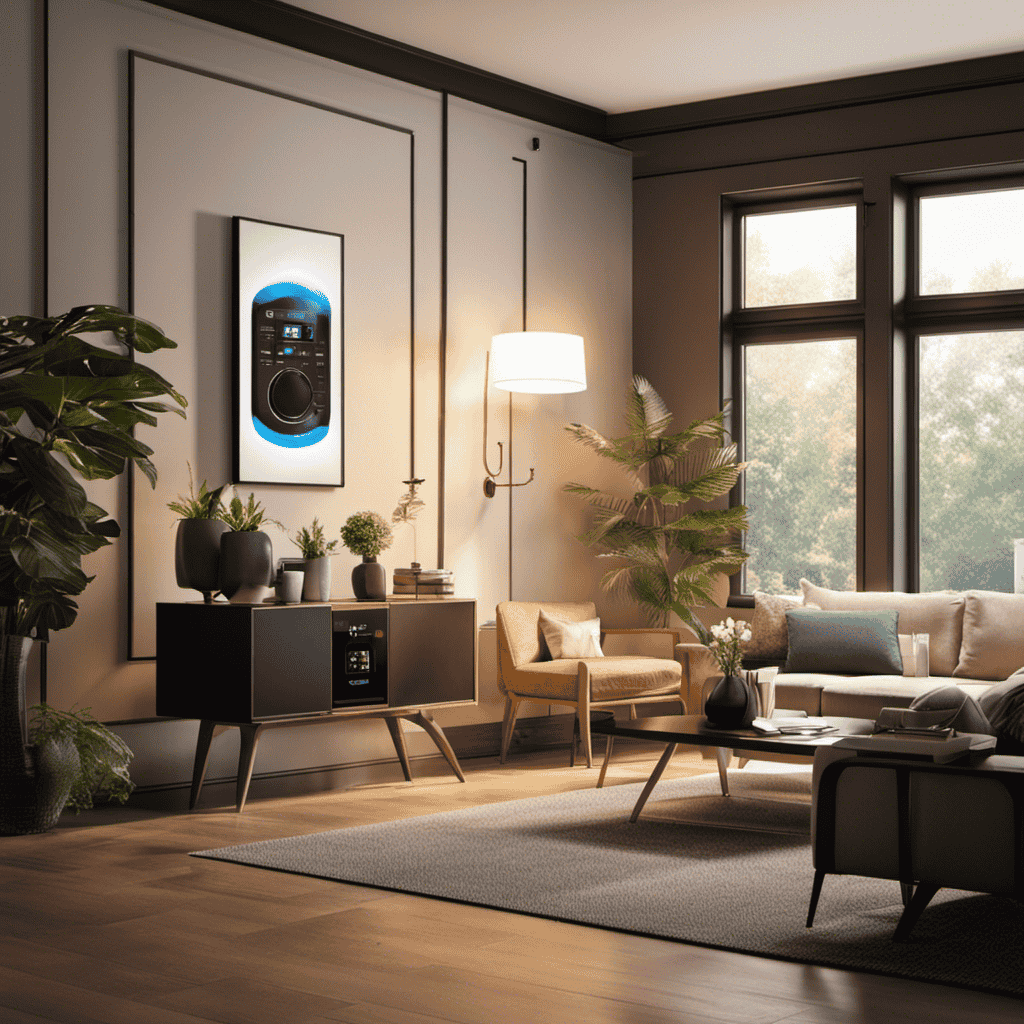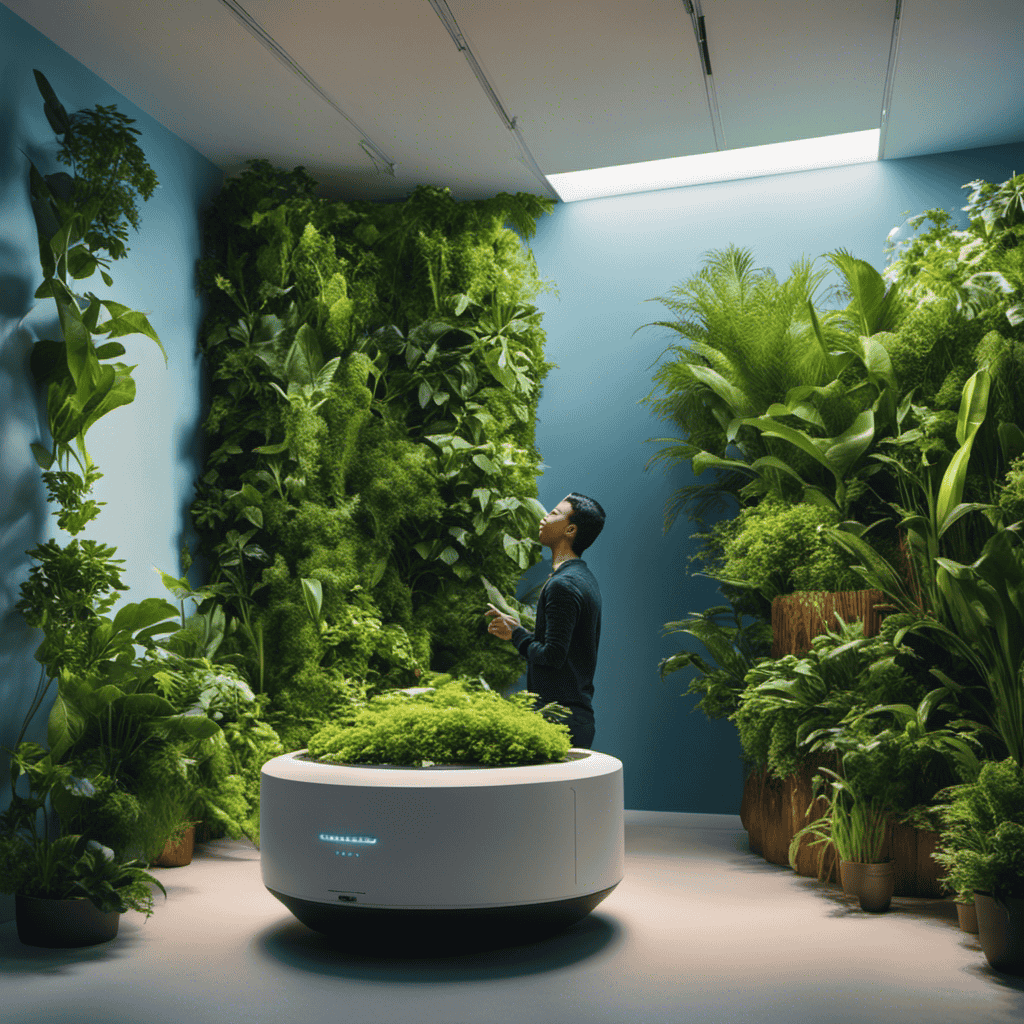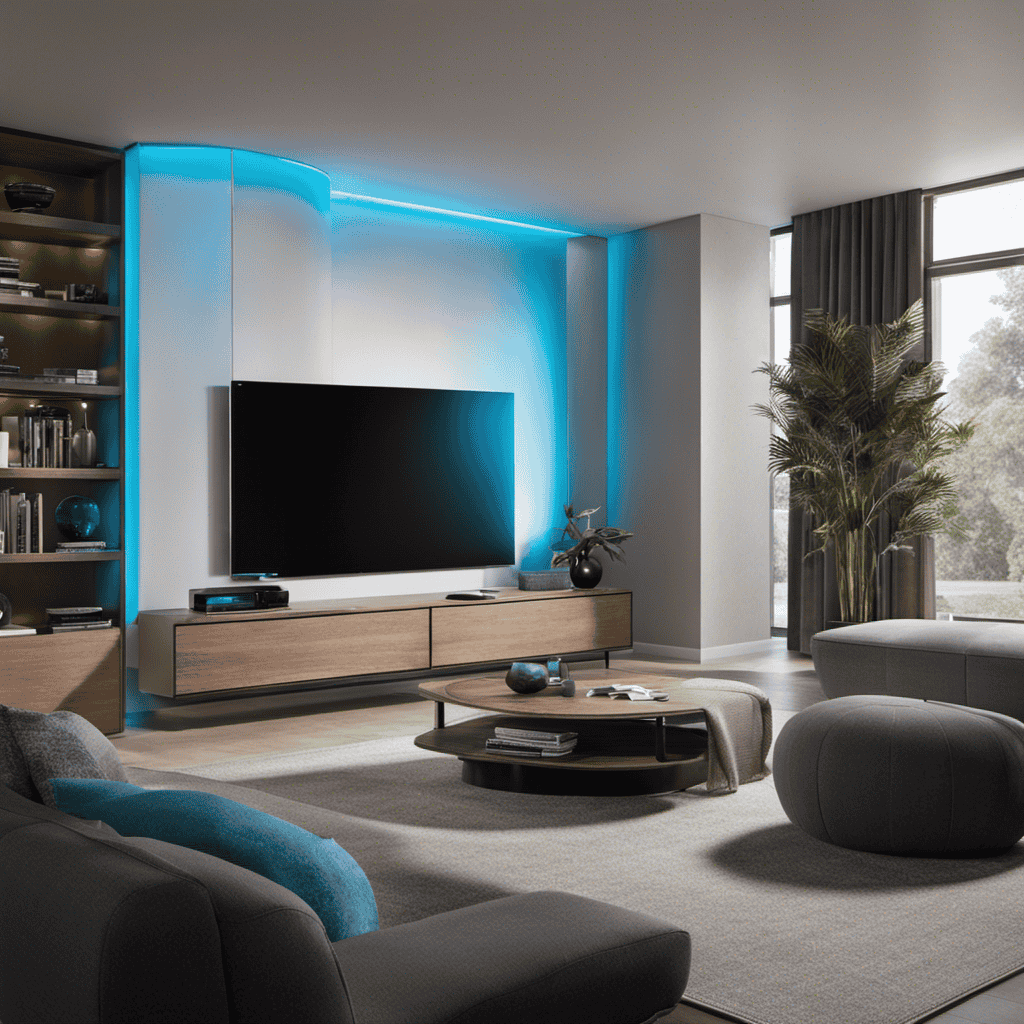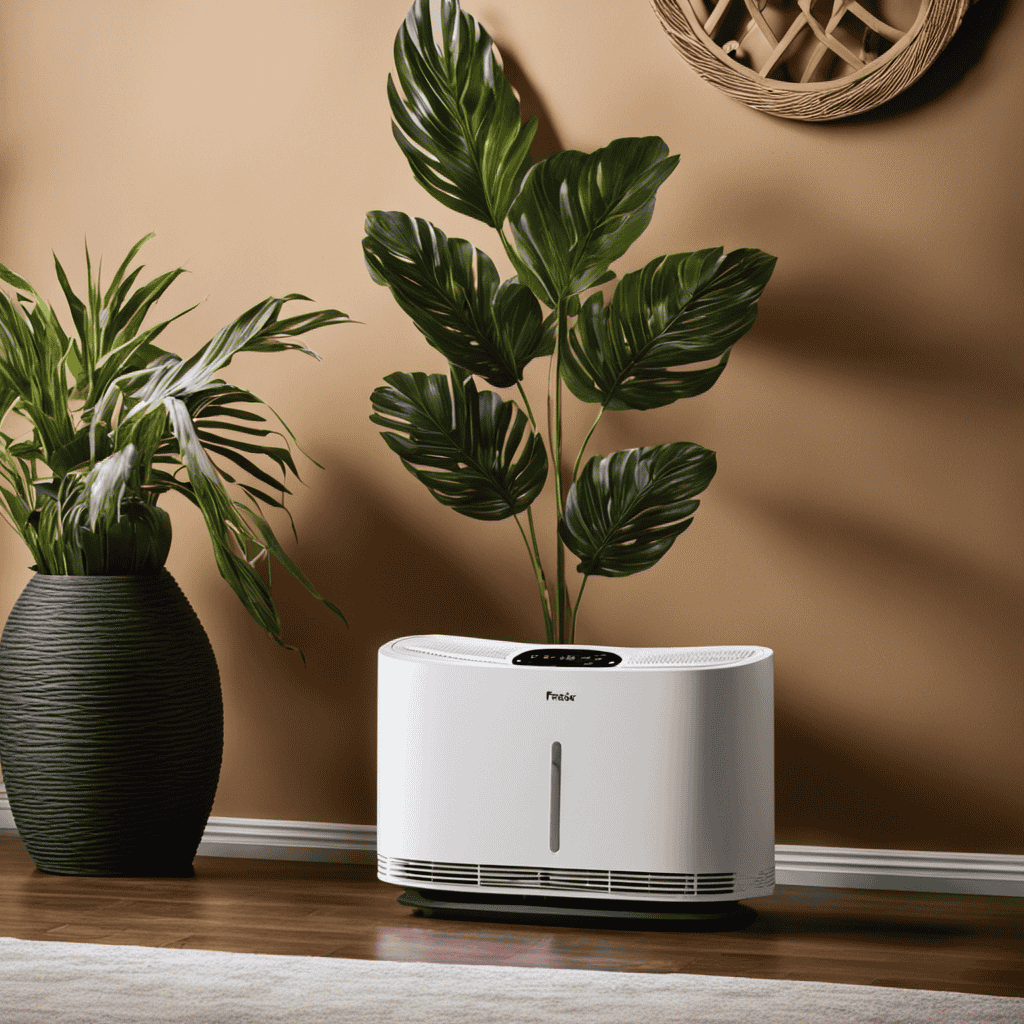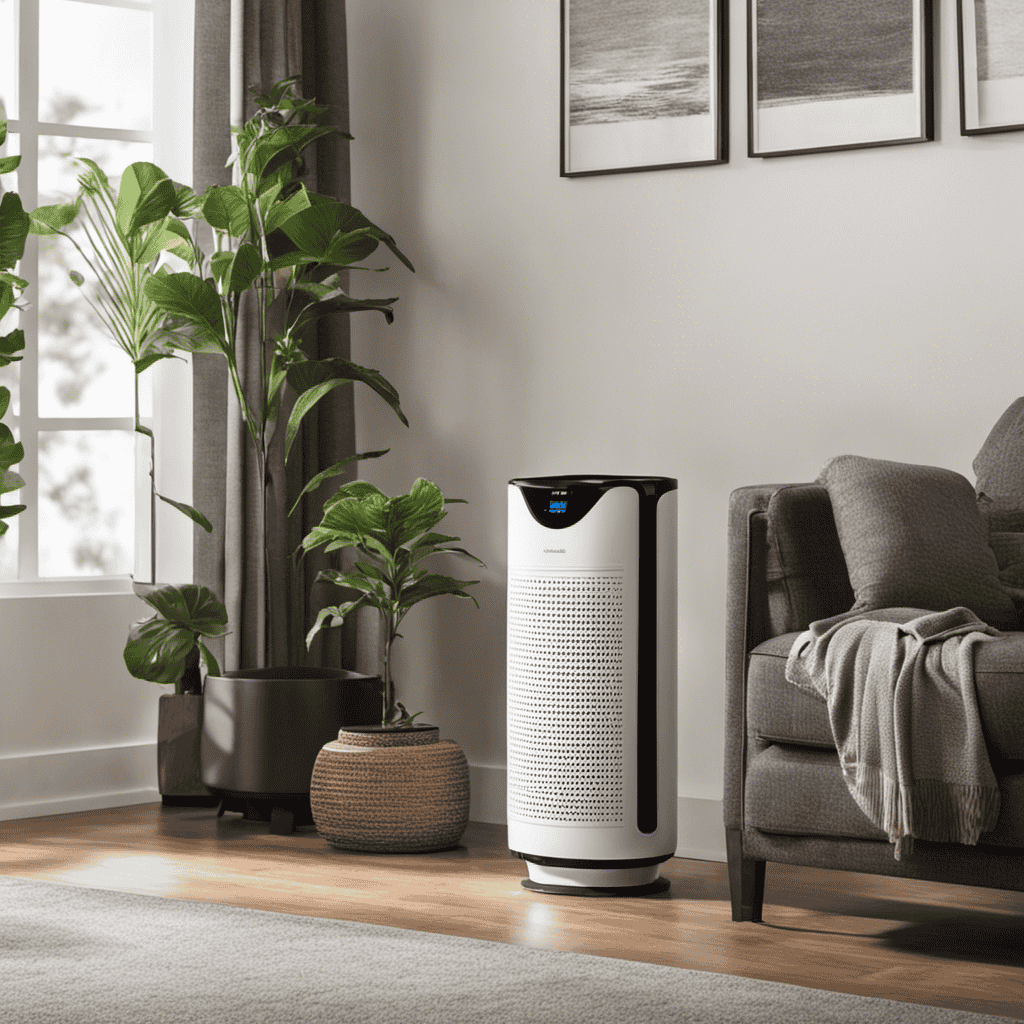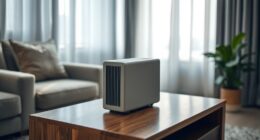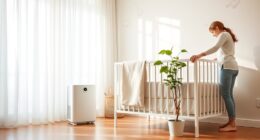I confess, I used to question the frequency at which I should run my air purifier. I wanted to ensure I was maximizing its effectiveness and maintaining clean, fresh air in my home.
So, I did some research and discovered some interesting findings. In this article, I’ll delve into the benefits of running an air purifier, factors to consider when determining usage frequency, and the recommended frequency of running an air purifier.
Let’s get started!
Key Takeaways
- Running an air purifier improves air quality in the home, reduces allergies and asthma symptoms, eliminates odors, and reduces dust and pet dander in the air.
- The frequency of running an air purifier depends on factors such as room size, level of air pollution, specific needs of individuals in the space, occupancy and pollution levels, and noise level, energy consumption, and cost.
- It is recommended to run an air purifier for a few hours each day or as needed, balancing health benefits with energy consumption.
- Signs that indicate the need for increased air purifier usage include lingering odors indoors, frequent allergic reactions, dust accumulation on surfaces, and pet odors or cooking smells requiring daily or continuous usage.
Benefits of Running an Air Purifier
You’ll be amazed at the benefits you’ll experience from running an air purifier. Not only does it help to improve the air quality in your home, but it also has several other advantages.
One of the main benefits is that it can help to reduce allergies and asthma symptoms. By filtering out allergens and pollutants from the air, an air purifier can provide relief to those with respiratory conditions.
Additionally, running an air purifier can help to eliminate odors and unpleasant smells in your home. It can also help to reduce the amount of dust and pet dander in the air, making it easier to keep your space clean.
Another advantage is that newer models have improved noise levels, making them quieter and more suitable for use in bedrooms or offices.
When it comes to maintenance, air purifiers usually require regular filter changes to ensure optimal performance.
Overall, the benefits of running an air purifier are numerous and can greatly improve the air quality in your home.
Now, let’s transition into the next section about factors to consider when determining usage frequency.
Factors to Consider When Determining Usage Frequency
When determining how frequently to use an air purifier, it’s important to consider various factors.
Factors to consider include:
- The size of the room
- The level of air pollution
- The specific needs of the individuals in the space
The best time to run an air purifier is when the room is occupied and when the pollution levels are highest, such as during peak pollen seasons or when there are smokers present.
Additionally, it’s important to consider the noise level of the air purifier, as running it at night may disrupt sleep. It’s also worth considering the energy consumption and cost of running the air purifier continuously versus intermittently.
Recommended Frequency of Running an Air Purifier
To ensure optimal air quality, it’s vital that you consider the recommended frequency for operating an air purifier.
The frequency at which you should run your air purifier depends on a few factors, including the size of your space, the level of pollutants in the air, and your specific health needs.
Running an air purifier consistently can provide numerous health benefits. It helps remove allergens, such as dust, pollen, and pet dander, which can trigger allergies and asthma symptoms. Additionally, air purifiers can capture and eliminate harmful particles, such as bacteria and viruses, improving overall indoor air quality.
However, it’s important to balance the health benefits with energy consumption. Running an air purifier continuously can lead to higher energy bills. Therefore, it’s recommended to run the air purifier for a few hours each day or as needed, depending on the air quality in your space and your specific health concerns.
Signs That Indicate the Need for Increased Air Purifier Usage
As someone who is concerned about maintaining a clean and healthy indoor environment, I have noticed a few key signs that indicate the need for increased air purifier usage.
First, lingering odors indoors can be a clear indication of poor air quality. Whether it’s the smell of cooking, pet dander, or other sources, these odors can linger and affect the overall indoor air quality.
Second, frequent allergic reactions such as sneezing, coughing, or itchy eyes can also be a sign that the air is not as clean as it should be. These reactions are often triggered by airborne particles like dust, pollen, or mold spores, which can be effectively removed with the help of an air purifier.
Lastly, dust accumulation on surfaces is another telltale sign that the air in your home is not being adequately filtered. Dust particles can settle on various surfaces, making them look dirty and requiring frequent cleaning.
Lingering Odors Indoors
You should consider running your air purifier more frequently if there are lingering odors indoors. Air purifiers are designed to eliminate pet odors and reduce cooking smells, among other things. By running your air purifier more often, you can effectively combat these unwanted odors and improve the indoor air quality of your home.
To better understand the benefits of running your air purifier more frequently, let’s take a look at the following table:
| Odor Type | Air Purifier Frequency |
|---|---|
| Pet Odors | Daily |
| Cooking Smells | During and after |
| Mold and Mildew | Continuous |
| Smoke | Continuous |
| Chemical Odors | Continuous |
As you can see, certain odors may require different frequencies of air purifier usage. Pet odors, for example, should be addressed on a daily basis to ensure a fresh-smelling home. Cooking smells, on the other hand, may require running the air purifier during and after cooking to effectively eliminate the odors.
Frequent Allergic Reactions
In my quest to eliminate lingering odors indoors, I have encountered another challenge: frequent allergic reactions. These reactions can be triggered by a variety of factors, such as dust mites, pet dander, pollen, and mold spores.
Understanding the causes of allergic reactions is crucial in managing allergies effectively. Dust mites, for example, thrive in warm and humid environments, and can be found in bedding, upholstery, and carpets. Pet dander, on the other hand, is a common allergen that can be found in homes with pets. Pollen, which is released by plants, can enter our homes through open windows and on our clothing. Mold spores can grow in damp areas, such as bathrooms and basements.
By minimizing exposure to these allergens through regular cleaning, maintaining a clean and dry home, and using air purifiers, we can effectively manage our allergies and reduce the frequency of allergic reactions.
Now, let’s explore another issue that contributes to indoor air pollution: dust accumulation on surfaces.
Dust Accumulation on Surfaces
Dust accumulation on surfaces can lead to poor indoor air quality and exacerbate allergic reactions. Regular furniture maintenance is crucial for maintaining a healthy living environment. Here are three important reasons why:
-
Reduced allergens: Dust is a common allergen that can trigger allergies and respiratory issues. Regularly cleaning and dusting surfaces helps to remove these allergens from our living spaces, reducing the risk of allergic reactions and promoting better indoor air quality.
-
Improved respiratory health: Breathing in dust particles can irritate the respiratory system, causing coughing, wheezing, and difficulty breathing. By regularly cleaning surfaces, we can minimize dust accumulation and improve our respiratory health.
-
Prolonged furniture lifespan: Dust can accumulate on furniture surfaces, leading to wear and tear over time. Regular cleaning not only keeps our furniture looking clean and fresh but also extends its lifespan, saving us money in the long run.
Taking the time for proper furniture maintenance not only keeps our living spaces clean but also provides significant health benefits.
Tips for Optimizing Air Purifier Performance
To maximize air purifier performance, it’s important to regularly clean or replace the filters. Clean filters allow the purifier to effectively capture and remove airborne pollutants, such as dust, pollen, and pet dander. Regularly cleaning or replacing the filters also helps prevent the build-up of dirt and debris, which can hinder the purifier’s performance. By maintaining your air purifier, you can ensure that it continues to provide high-quality air for you and your family.
The importance of air quality cannot be overstated, as poor air quality can lead to various health issues, including allergies, respiratory problems, and even cardiovascular issues. So, make sure to prioritize air purifier maintenance to keep your indoor air clean and healthy.
How to Schedule Air Purifier Usage in Different Seasons
During different seasons, it’s helpful to establish a schedule for when you’ll use your air purifier. This ensures that you’re getting the most out of your device and maintaining optimal indoor air quality throughout the year.
Here are a few key considerations for scheduling air purifier usage:
-
Spring: As pollen counts rise during this season, running your air purifier consistently can help alleviate allergy symptoms and improve overall air quality.
-
Summer: With increased outdoor activities and open windows, running your air purifier 24/7 can help filter out allergens and pollutants brought in from outside.
-
Winter: As indoor spaces are closed up to keep warm, running your air purifier regularly can help remove dust, pet dander, and other indoor pollutants.
Remember to clean and maintain your air purifier regularly to ensure its effectiveness. Regularly changing filters and cleaning the device will prolong its lifespan and maintain its efficiency.
Common Mistakes to Avoid When Using an Air Purifier
One mistake you might make when using an air purifier is forgetting to regularly clean and maintain it for optimal performance. Proper air purifier maintenance is crucial to ensure that it continues to effectively remove pollutants from the air.
Cleaning the filters on a regular basis is essential, as dirty filters can reduce the purifier’s efficiency and even release trapped pollutants back into the air. Additionally, it is important to clean the exterior and vents of the air purifier to prevent the build-up of dust and debris. Regular maintenance also includes checking the manufacturer’s instructions for any specific cleaning recommendations or replacement parts.
Furthermore, choosing the right air purifier model for your specific needs is also crucial. Consider factors such as the size of the room, the type of pollutants you want to eliminate, and the noise level of the purifier. Taking these steps will help ensure that your air purifier functions optimally and provides you with clean and healthy indoor air.
Frequently Asked Questions
Are There Any Health Risks Associated With Running an Air Purifier Too Frequently?
Running an air purifier frequently can improve air quality and have health benefits. However, it is important to consider potential risks such as dryness or irritation of the respiratory system.
Can Running an Air Purifier Too Often Lead to Higher Energy Consumption and Increased Electricity Bills?
Running an air purifier too often can lead to higher energy consumption and increased electricity bills. However, it’s important to strike a balance as excessive use may also pose potential health risks.
Is It Necessary to Run an Air Purifier All Day and Night, or Is It Sufficient to Use It Only During Specific Times?
It is not necessary to run an air purifier all day and night. The optimal timing depends on your needs, such as when you are sleeping or in a polluted environment. Consider noise levels as well.
Are There Any Specific Types of Air Pollutants or Allergens That Require More Frequent Usage of an Air Purifier?
There are certain types of allergens and pollutants that may require more frequent usage of an air purifier. Its effectiveness depends on the specific contaminants present. For optimal results, it’s recommended to run the air purifier consistently.
Can Running an Air Purifier Too Often Affect the Lifespan or Performance of the Device?
Running an air purifier too often can lead to decreased effectiveness and potential noise disturbances. It’s important to find a balance, considering the specific needs of your indoor environment and the recommendations of the manufacturer.
Conclusion
In conclusion, running an air purifier regularly is essential for maintaining clean and healthy indoor air. By filtering out pollutants and allergens, an air purifier can improve the overall air quality in your home.
However, determining the frequency of usage depends on various factors such as the size of your space, the level of pollutants, and the specific needs of your household.
It’s like a diligent gardener tending to their plants, ensuring that the air you breathe is as fresh and pure as a blossoming garden.
So, don’t forget to schedule regular usage of your air purifier for optimal performance and a breath of fresh air.
